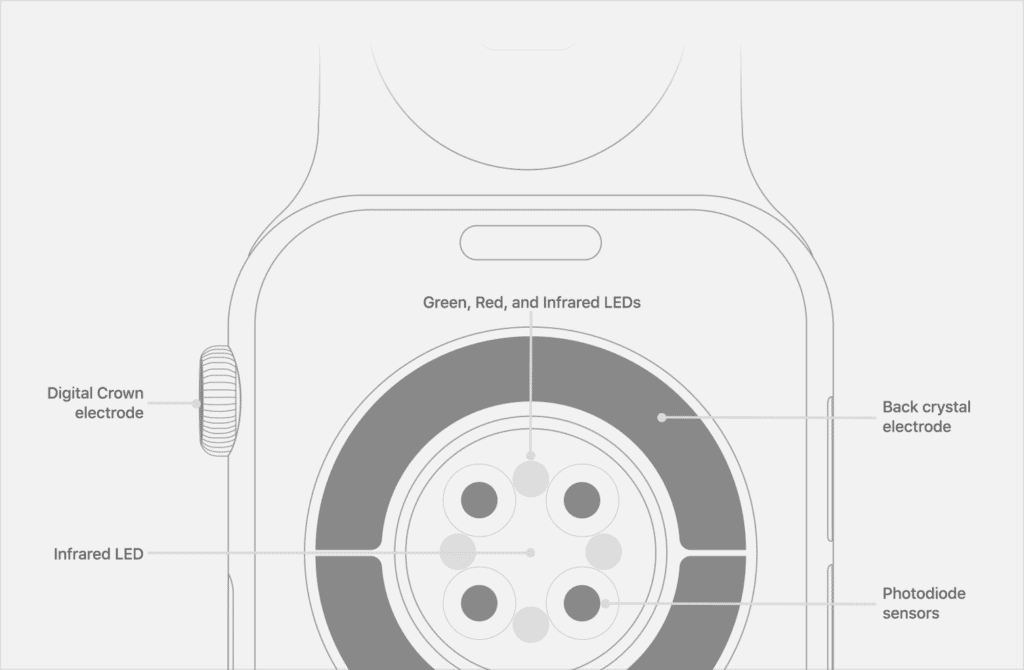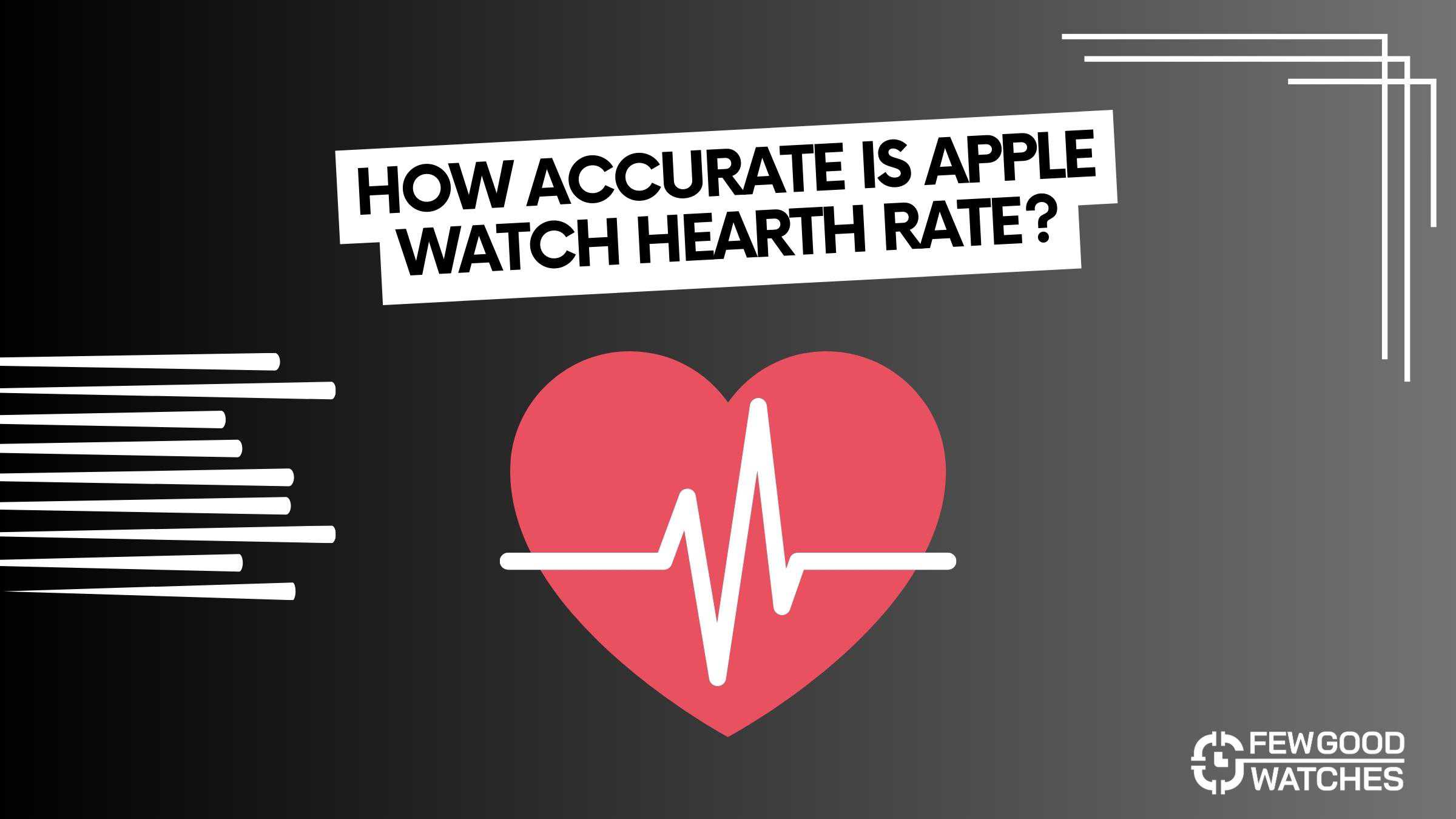Gone are the days when you’d need to go to a doctor or use a sphygmomanometer to get an idea about your heart rate. In fact, more recent iterations of the Apple Watch, are able to get you an accurate BP reading as well. However, this begs the question, how accurate are the heart rate readings you get from an Apple Watch?
The Apple Watch heart rate sensor is generally considered to be quite accurate for measuring heart rate during various activities. It uses advanced optical sensors to monitor your heart rate continuously throughout the day, during workouts, and even at rest. While it provides accurate heart rate data for most users, factors not tight enough, movement during exercise, and tattoos on the wrist can affect its accuracy.
How Does An Apple Watch Measure Your Heart Rate?
Let’s understand how the Apple Watch measures your heart rate. Ever noticed a green LED gleaming at the edge of your Watch? Well, that’s your device going to work!

In simple terms, an Apple Watch uses tiny green LEDs that house tiny diodes which are photosensitive. When your blood flows, these diodes are able to accurately predict the amount of blood flowing through your wrist.
With that said, there’s a difference between the amount of blood that flows compared to when your heart beats and when it doesn’t. So, by gauging the amount of light absorbed, an Apple Watch can predict the amount of time your heart takes to beat and provide a relatively accurate reading.
The Optical Sensor (Infrared)
Green LEDs are not all an Apple Watch uses. While considered relatively old, Infrared can still provide a highly accurate reading of your heart rate. Since the primary method consumes a lot of your battery, the Apple Watch’s infrared sensor is used to provide background heart rate information.
Here’s a quick look at when either of these sensors are used:
| Infrared Sensor | Optical Heart Sensor |
| Background Heart Rate Measurement | Heart Rate Variability (HRV) |
| Extra Calibrations | Workouts |
How Accurate Is Apple Watch Heart Rate Overall?

With all the technical jargon out of the way, how accurate is the Apple Watch in terms of measuring your heart rate? While we aren’t researchers by any means, we’ve done a few tests with the Apple Watch ourselves and have been pleasantly surprised by the results. Here’s a quick look:
| Device Used | Person 1 | Person 2 |
| Clinical Sphygmomanometer | 65 | 74 |
| Apple Watch Series SE | 64 | 76 |
| Variance | 1.55% | 2.6% |
Considering the fact that your heart rate can vary on its own, from our testing, the Apple Watch’s heart rate measurement is extremely accurate. However, it’s quite okay if you aren’t so sure of our tests.
Is The Apple Watch Clinically Accurate?
Thankfully, a medical report done by JMIR Mhealth also reaches the same conclusion. In essence, the Apple Watch was deemed as a clinically acceptable way to measure the heart rate of an individual who suffers from cardiovascular disease.
Why is that finding important? In essence, this signifies the fact that the Apple Watch can indeed be used for clinical measurements. For a device to be considered as clinically accurate, it needs to carry the same level of accuracy as that of a device that is already being used medically.
Therefore, the heart rate measurement on the Apple Watch is accurate and can be used to accurately determine one’s heart rate.
Can The Apple Watch’s Heart Rate Be Used For Diagnosis?
If the Apple Watch is clinically accurate, can it be used by a medical professional to check your heart rate? While it can be used to get a reading, it cannot be used to determine your exact heart rate due to a few reasons:
- Personalized Approach: Unlike a clinical device that can cater to multiple users, an Apple Watch, though, only retains information for a specific user.
- Not Always Viable: Having wet hands, damaged skin, or just a bad sensor can be one of the multitudes of reasons an Apple Watch just doesn’t give you an accurate reading.
- Detailed Statistics: The Health app, while intuitive, does not allow you to quickly export data or plot it in a way that helps doctors formulate an accurate result.
All in all, an Apple Watch remains a great device for tracking your health and fitness. While the heart rate measurement is extremely accurate and even clinically so, it does carry with it some caveats that may hinder its usage in a more professional setting.
Conclusion
The heart rate readings obtained from an Apple Watch are generally considered to be quite accurate for most users.
When compared to clinical sphygmomanometers, the Apple Watch’s heart rate measurement showed a variance of around 1.55% to 2.6%, indicating a high level of accuracy. Medical reports also support the device’s clinical acceptability for measuring heart rate in individuals with cardiovascular disease.
However, the Apple Watch’s heart rate readings may not be suitable for medical diagnosis due to personalized data storage, potential issues with sensor accuracy, and limitations in exporting detailed statistics for medical professionals. Despite these caveats, the Apple Watch remains an exceptional device for health and fitness tracking, providing users with valuable insights into their well-being and heart rate trends.
FAQ
Should Apple Watch be tight for heart rate?
Yes, for accurate heart rate monitoring, it is recommended to wear the Apple Watch snugly on your wrist. A secure and close-fitting placement ensures that the device’s heart rate sensors make proper contact with your skin, allowing for more reliable heart rate readings during various activities.
I bought my first smartwatch in 2018 and have been wearing one ever since. It might get frustrating at times to receive 100 notifications a day. That's why we need to know how to make the best of them and how to use them to improve our daily lives, not the other way around. I write about the newest smartwatches, I create top picks, and I write helpful guides and simply explain complicated things.

